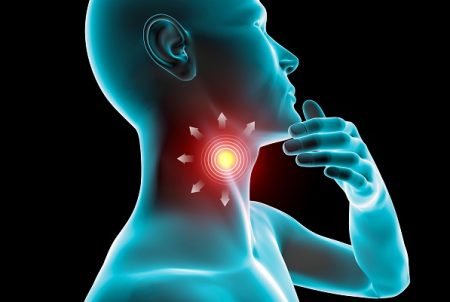Risk Factors and Causes of Strep Throat
- Updated on: Jun 11, 2024
- 4 min Read
- Published on Apr 21, 2021


Strep throat is a bacterial infection that can spread to other people easily. It is a highly contagious infection. Mostly children but some adults too are more likely to get strep throat than others. It begins generally as a mild infection, but can cause serious complications if not treated on time. Someone who tests positive for strep throat but has no symptoms is called a strep carrier.
It causes high fever and inflammation of the throat and tonsils. As the symptoms of strep throat are similar to that of a cold or the flu, many people never go or delay in going to the doctor to get the proper treatment.
See also: Treatment of strep throat
See also: Symptoms of strep infection
Causes of strep throat: How do strep throat bacteria (Streptococcal) spread?
Sore throats are mostly caused by viruses, but strep throat is caused by bacteria called group A Streptococcus or simply group A strep. It is the primary cause of strep throat.
Streptococcal bacteria are highly contagious. They can spread through air when someone with the infection coughs or sneezes. This can cause strep throat to others. They can also spread when someone shares food or drinks or when there is a physical contact such as when you shake hands with bacteria or touch a doorknob or other surface. The bacteria can then transfer from these surfaces to your nose, mouth or eyes.
The streptococcal infection affects your pharyngeal tissue and causes an inflammatory reaction in the throat and tonsils. These bacterial organisms are generally present in your throat or on your skin. They can cause other illnesses also such as impetigo (a skin disease).
Some people may carry Group A Streptococcus in the throat or other body parts but do not show any signs or symptoms of disease (asymptomatic). These are called carriers of strep throat as are discussed hereafter. Such people can however spread the bacteria and cause strep throat to other.
What are the risk factors of getting strep throat infection?
Possible risk factors for strep throat infection are:
- Young age – it occurs mostly in children
- Time in a year – it tends to occur more frequently in late fall and early spring
Why is strep throat more common in school going children?
Strep throat is most common in school-going children. The peak incidence is between 5 to 15 years of age. This is primarily because they are young and are at high risk and also remain in contact with other children in the school. If someone has a strep throat infection or is a carrier, others are likely to get it due to close contact. It is more common during the school year when groups of students are present in enclosed spaces.
However, adults may also develop strep throat, though not as often as in children. Adult cases of strep throat range about 5% to 10% of cases of the infection.
What is a strep throat carrier?
Many people have strep bacteria living in their throat, mouth, and nose, still they do not show any signs or symptoms of the infection. These people are called strep throat carriers. While they are perfectly healthy, yet they can spread the infection to others and infect them with the strep bacteria.
What does being a strep throat carrier mean? Am I strep carrier?
As mentioned, being a strep carrier means that you have the strep bacteria living in your body. But the bacteria do not cause you any symptoms.
Carriers generally do not cause harm, but they can be cause potential complications for repeated illness in future as the bacteria can return back even after the symptoms are gone.
Sometimes, certain external factors may cause the strep bacteria to become active in your body, which affects your health.
How can you know if you are a strep throat carrier?
Tests can be done to diagnose whether you are a strep carrier. These tests are generally done to test for strep throat carrier:
- Throat culture
- Rapid strep test
A strep carrier tests positive on these tests, even if the individual does not experience any symptoms of strep throat.
Can bacteria affect the health of strep throat carriers too?
A strep carrier generally does not become ill from the bacteria in the body, but there are certain factors that can activate the bacteria to cause an illness in a strep throat carrier. These are:
- Weakened immune system
- Stress
- Contacting an affected individual
How common are strep throat carriers?
In a study tested on about 1,400 healthy kids between the ages of 3 months and 14 years of age, tests were conducted for strep bacteria. It was found that almost 1 in 10 children are strep throat carriers.
When a strep throat carrier has a sore throat, it is hard to distinguish between strep throat and other illnesses because a strep throat test shows positive signs whether or not the carrier is experiencing strep throat symptoms.
Should strep throat carriers take antibiotics?
Antibiotics can be given if it is known that the symptoms in a strep throat carrier are caused by strep throat. Antibiotics can help the bacterial infection go away faster. However, even after taking the antibiotic, the strep bacteria will likely return to the carrier, though it may not cause any symptoms.
What to do if you or someone in your family is a strep throat carrier?
In most cases, it requires nothing unless illness occurs frequently within the carrier’s family. In such cases, these treatment options are recommended by doctors as appropriate:
- Antibiotics in strong dosages
- Tonsillectomy
When should a strep throat carrier visit a doctor?
Visit your doctor if you are experiencing these symptoms:
- Red, sore throat
- White patches
- Chills
- Fever
- Pain with swallowing
- Tenderness in neck glands or lymph nodes












